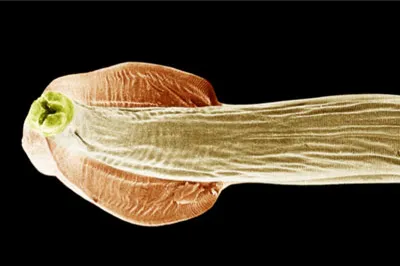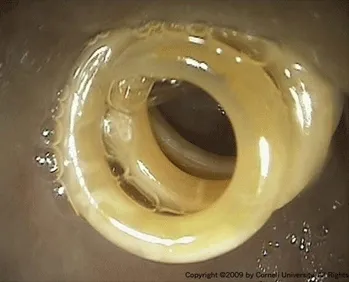Roundworms are a common intestinal parasite affecting dogs, with nearly all dogs encountering them at some point in their lives, particularly during puppyhood. Their widespread transmission makes them challenging to manage. Understanding the signs, especially those visible in your dog’s stool, is crucial for prompt treatment and safeguarding your pet’s health and that of your family.
 Dogs can contract roundworms even before birth, as the mother can transmit them in utero. Post-birth, puppies can become infected by ingesting contaminated eggs from their environment or consuming larvae present in their mother’s milk. Furthermore, a dog can ingest roundworm larvae by preying on small mammals like mice that carry the parasite. This multifaceted transmission means vigilance is key for any dog owner.
Dogs can contract roundworms even before birth, as the mother can transmit them in utero. Post-birth, puppies can become infected by ingesting contaminated eggs from their environment or consuming larvae present in their mother’s milk. Furthermore, a dog can ingest roundworm larvae by preying on small mammals like mice that carry the parasite. This multifaceted transmission means vigilance is key for any dog owner.
How Roundworms Affect Your Dog
Adult roundworms reside within a dog’s intestines. While many dogs may show no outward signs of infection, significant infestations, especially in puppies, can lead to noticeable symptoms. These include diarrhea, vomiting, unexplained weight loss, a dull and unkempt coat, and a distended, pot-bellied appearance. In some cases, if the roundworms migrate to the lungs, a persistent cough may develop.
The most direct and often alarming sign of a roundworm infection is their visual presence. You may discover adult roundworms in your dog’s feces or vomit. These parasites typically appear white or light brown and can vary in length, sometimes reaching several inches. This visual confirmation is a clear indicator that veterinary intervention is necessary.
Identifying Roundworm Signs in Dog Poop
The appearance of your dog’s stool can offer critical clues about the presence of roundworms. While not all infected dogs will have visible worms in their feces, it’s a common and definitive sign.
- Visible Worms: The most obvious sign is spotting actual roundworms in your dog’s poop. They often resemble spaghetti strands, are white or a pale brown, and can be anywhere from a few inches to several inches long. They might appear as moving threads in fresh feces.
- Diarrhea: Roundworm infections can irritate the intestinal lining, leading to inflammation and diarrhea. The stool may be loose, watery, or contain mucus. In severe cases, the diarrhea might be bloody.
- Vomiting: If the roundworm infestation is heavy, or if worms migrate into the stomach, vomiting can occur. Sometimes, live or dead roundworms may be expelled in the vomit.
- Poor Stool Consistency: Even without visible worms, a generally poor stool quality, such as very soft stools or inconsistent bowel movements, can be an indirect sign of intestinal parasites.
- Blood in Stool: While less common, significant irritation or damage to the intestinal wall caused by a heavy roundworm load can sometimes lead to blood in the stool. This could appear as bright red streaks or a darker, tarry consistency if the bleeding is higher up in the digestive tract.
 It is important to note that other intestinal parasites or health issues can mimic these symptoms. Therefore, any concerns about your dog’s stool should always be evaluated by a veterinarian.
It is important to note that other intestinal parasites or health issues can mimic these symptoms. Therefore, any concerns about your dog’s stool should always be evaluated by a veterinarian.
Prevention and Treatment Strategies
Given the various ways roundworms can infect dogs, a multi-pronged approach to prevention is essential. Maintaining a clean living environment for your dog is paramount. This includes promptly removing feces from your yard and any areas where your dog spends time. If possible, prevent your dog from hunting and consuming wild animals, as these can be carriers of roundworm larvae.
For puppies, a strict deworming schedule is crucial. Puppies should typically be treated at 2, 4, 6, and 8 weeks of age. Following this initial series, monthly preventive treatments are often recommended. Regular fecal examinations are also vital, with veterinarians recommending 2 to 4 tests during a puppy’s first year and 1 to 2 annually for adult dogs. Nursing mother dogs should also be kept on a monthly preventive and treated concurrently with their puppies to minimize transmission risk.
Many popular heartworm preventive medications also offer protection against roundworms. Consulting with your veterinarian is the best way to determine the most appropriate prevention and treatment options tailored to your dog’s specific needs and lifestyle.
Roundworms and Human Health Risks
It is vital to understand that roundworms pose a significant health risk not only to dogs but also to humans, particularly children. Contact with soil contaminated by infected dog feces can lead to human ingestion and subsequent infection. Roundworm eggs are highly resilient and can accumulate in large numbers in soil where pets frequently defecate.
In humans, roundworm infections can manifest in various ways, including symptoms affecting the eyes, lungs, heart, and nervous system. To mitigate this risk:
- Children should be closely supervised and prevented from playing in areas where animals are known to have defecated.
- Individuals who handle soil, such as gardeners, should wear gloves.
- Thorough handwashing with soap and water after any potential contact with contaminated soil or pet feces is essential.
For veterinary professionals, more detailed information on roundworms can be found at https://www.capcvet.org/guidelines/ascarid/.
